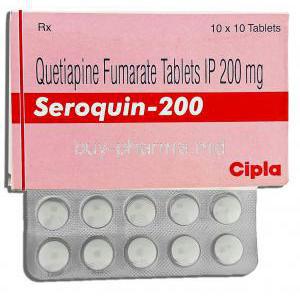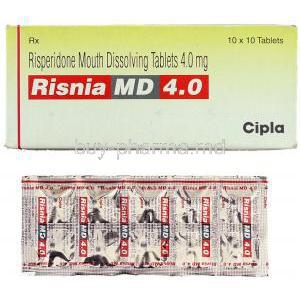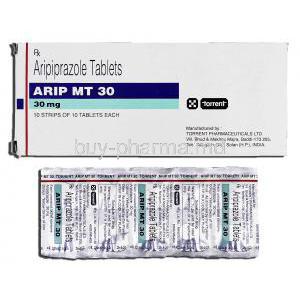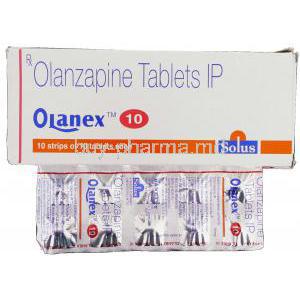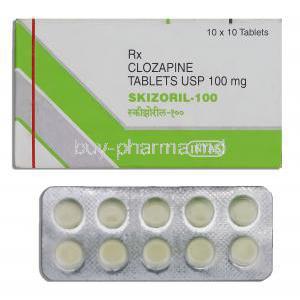1. Introduction to Risperidone and Trihexyphenidyl
Risperidone and Trihexyphenidyl are frequently co-administered in the treatment of psychiatric disorders to balance therapeutic efficacy with improved tolerability. Risperidone is an atypical antipsychotic, while Trihexyphenidyl is a centrally acting anticholinergic. This combination addresses both the underlying psychiatric condition and the often-debilitating extrapyramidal side effects (EPS) caused by antipsychotic treatment.
Their combined use is particularly common in long-term schizophrenia management, where persistent symptoms require sustained dopamine receptor blockade. This blockade, however, increases the risk of drug-induced Parkinsonism, which is mitigated by Trihexyphenidyl.
Risperidone was developed in the 1990s and gained popularity due to its improved safety profile over typical antipsychotics. Trihexyphenidyl has been used since the mid-20th century, particularly in Parkinson's disease, and remains a mainstay for EPS management.
2. Composition and Pharmaceutical Formulations
This combination may be administered as separate tablets or, in some regions, in fixed-dose combinations. Common formulations include:
- Risperidone: 0.5 mg, 1 mg, 2 mg, 3 mg, 4 mg tablets; oral solution (1 mg/mL); injectable long-acting form (25–50 mg every 2 weeks)
- Trihexyphenidyl: 2 mg, 5 mg tablets; oral solution (2 mg/5 mL)
Brands vary by region. Notable examples include Risperdal (Risperidone) and Artane (Trihexyphenidyl), alongside numerous generic equivalents globally available.
3. Mechanism of Action
3.1 How Risperidone Works in the Body
Risperidone exerts its antipsychotic effects by antagonizing dopamine D2 and serotonin 5-HT2A receptors. The dopaminergic blockade alleviates positive psychotic symptoms such as delusions and hallucinations, while serotonin antagonism contributes to mood stabilization and reduces EPS risk compared to first-generation agents.
3.2 How Trihexyphenidyl Works in the Body
Trihexyphenidyl blocks muscarinic acetylcholine receptors in the central nervous system, restoring the dopamine-acetylcholine balance disturbed by antipsychotic-induced dopamine blockade. This leads to improved motor control and reduction of EPS manifestations such as tremors, rigidity, and dystonia.
3.3 Combined Mechanism in Psychiatric Treatment
When used together, these agents provide a dual benefit: Risperidone addresses the core psychiatric pathology, and Trihexyphenidyl enhances tolerability. The synergy reduces patient drop-out from treatment due to distressing side effects and enhances adherence in chronic therapy for schizophrenia and bipolar disorder.
4. Approved Medical Uses
4.1 Indications for Risperidone
- Schizophrenia in adults and adolescents aged ≥13 years
- Acute manic or mixed episodes associated with bipolar I disorder
- Irritability associated with autistic disorder in pediatric patients aged 5–16 years
4.2 Indications for Trihexyphenidyl
- Idiopathic Parkinson’s disease (as monotherapy or adjunct)
- Post-encephalitic and arteriosclerotic parkinsonism
- Extrapyramidal symptoms induced by antipsychotics
4.3 Combined Use in Clinical Practice
This drug combination is frequently employed in psychiatric practice to:
- Prevent or treat EPS in patients on long-term antipsychotic therapy
- Enhance patient compliance and quality of life in schizophrenia management
5. Off-Label and Investigational Uses
Beyond their approved indications, Risperidone and Trihexyphenidyl have demonstrated potential in several off-label contexts:
- Tourette’s syndrome: Reduction of tics and behavioral outbursts
- Post-traumatic stress disorder (PTSD): Adjunctive treatment for psychotic features
- Delirium: Used cautiously in elderly hospitalized patients with hyperactive features
- Obsessive-compulsive disorder (OCD): Augmentation in resistant cases
- Hyperprolactinemia: Management of antipsychotic-induced elevations
6. Dosage and Administration Guidelines
6.1 Standard Adult Dosing
- Risperidone: Start at 1–2 mg/day; maintenance 2–6 mg/day
- Trihexyphenidyl: Start at 1–2 mg/day; titrate up to 5–15 mg/day based on response
Both drugs are typically administered once or twice daily. Titration should be individualized according to tolerance and therapeutic response.
6.2 Pediatric Dosage Considerations
In children, lower initial doses are recommended with careful upward titration. Risperidone may begin at 0.25 mg/day for those under 50 kg. Trihexyphenidyl is rarely used in young children and requires specialist supervision due to cognitive risks.
6.3 Geriatric Dosage Adjustments
Reduced renal and hepatic function in older adults necessitates lower starting doses. Close monitoring is essential due to increased sensitivity to side effects, particularly sedation and cognitive impairment.
7. Administration in Special Populations
7.1 Use in Elderly Patients
- Increased susceptibility to orthostatic hypotension and sedation
- Greater risk of anticholinergic delirium and confusion
- Monitor for falls, especially in patients with multiple comorbidities
7.2 Use in Pregnant and Nursing Women
- Risperidone is pregnancy category C; use only if benefits outweigh risks
- Trihexyphenidyl lacks comprehensive pregnancy safety data
- Both drugs may pass into breast milk; breastfeeding is generally discouraged
7.3 Use in Children and Adolescents
Pediatric use should involve close psychiatric monitoring. Risperidone may impact weight, glucose tolerance, and prolactin levels. Cognitive effects and behavioral changes should be tracked, especially with Trihexyphenidyl.
8. Common and Serious Side Effects
8.1 Frequently Reported Side Effects
- Somnolence, fatigue, and dizziness
- Dry mouth, blurred vision, constipation (Trihexyphenidyl)
- Increased appetite and weight gain (Risperidone)
- Insomnia and restlessness
8.2 Serious Adverse Effects
- Neuroleptic malignant syndrome: A rare but potentially fatal complication
- Tardive dyskinesia: Involuntary facial or limb movements
- Severe anticholinergic effects: Memory loss, urinary retention, hallucinations
- Metabolic syndrome: Hyperglycemia, dyslipidemia, and hypertension
9. Drug Interactions and Incompatibilities
- CYP2D6/CYP3A4 inhibitors: Can increase plasma levels of Risperidone
- Alcohol and CNS depressants: Enhance sedative effects
- Antihypertensives: Additive hypotensive effects possible
- Other anticholinergics: Potentiation of cognitive and peripheral side effects
Patients should be screened for all concomitant medications, including over-the-counter drugs and herbal supplements, to prevent adverse interactions.
10. Contraindications and Black Box Warnings
The use of Risperidone and Trihexyphenidyl is contraindicated in specific patient populations due to potential life-threatening risks and exacerbation of underlying conditions.
- Hypersensitivity Reactions: Patients with a known allergy to Risperidone, Trihexyphenidyl, or any of their excipients should not receive this combination. Anaphylaxis, rash, and angioedema have been reported.
- Dementia-Related Psychosis: A Black Box Warning applies to Risperidone and other antipsychotics, indicating an increased risk of mortality in elderly patients with dementia-related psychosis. These patients are more likely to experience stroke, heart failure, or sudden death.
- Glaucoma and Prostatic Hypertrophy: Due to its potent anticholinergic properties, Trihexyphenidyl is contraindicated in patients with narrow-angle glaucoma or obstructive uropathy. It may worsen urinary retention and raise intraocular pressure, posing significant danger to these individuals.
11. Important Precautions and Monitoring Parameters
To ensure safety during long-term therapy, continuous monitoring and individualized risk assessments are essential.
- Neurological Assessment: Periodic evaluation of motor function is crucial to detect early signs of tardive dyskinesia, parkinsonism, or akathisia. Mental status should also be routinely checked for signs of sedation, confusion, or psychomotor agitation.
- Endocrine Monitoring: Risperidone can elevate serum prolactin levels, potentially causing amenorrhea, galactorrhea, gynecomastia, or decreased libido. Periodic monitoring is advised in long-term users, especially adolescents and reproductive-age adults.
- Cardiac Surveillance: Baseline and follow-up ECGs are recommended in patients at risk of QT prolongation. Risperidone, especially in higher doses or in combination with other QT-prolonging drugs, can lead to ventricular arrhythmias and torsades de pointes.
12. Handling, Storage, and Disposal
Proper storage and disposal practices help maintain medication efficacy and prevent accidental exposure or misuse.
- Storage Conditions: Risperidone and Trihexyphenidyl tablets and liquids should be stored at 20°C to 25°C (68°F to 77°F), away from moisture, heat, and direct light. Injectable forms require refrigeration unless otherwise specified.
- Handling Precautions: Oral solutions should be measured accurately using calibrated devices. Injectable formulations should be handled under aseptic conditions to avoid contamination. Care must be taken to prevent pediatric access.
- Disposal: Expired or unused medication should not be flushed or poured down drains. Return to authorized medication take-back programs or follow FDA guidelines for disposal in household trash using a sealed container and unpalatable substance (e.g., coffee grounds).
13. Overdose Management and Emergency Protocol
Overdose of either Risperidone or Trihexyphenidyl can precipitate critical and potentially fatal events. Immediate medical intervention is necessary.
- Symptoms of Overdose:
- Risperidone: Somnolence, tachycardia, hypotension, extrapyramidal symptoms, QT prolongation
- Trihexyphenidyl: Dry mucous membranes, mydriasis, delirium, urinary retention, hallucinations, seizures, hyperthermia
- Emergency Management: Supportive care is the mainstay. Secure airway, ensure adequate ventilation, and monitor vital signs closely. Intravenous fluids may be required to maintain blood pressure.
- Antidotes and Advanced Care: In cases of anticholinergic toxicity, physostigmine may be cautiously administered under ICU monitoring. Cardiac rhythm disturbances require advanced life support and antiarrhythmic measures. Activated charcoal may be useful if ingestion was recent.
14. Clinical Monitoring and Follow-Up Care
Patients on long-term Risperidone and Trihexyphenidyl therapy must undergo regular evaluations to optimize treatment efficacy and mitigate long-term risks.
- Metabolic Monitoring: Track body weight, waist circumference, fasting blood glucose, and lipid profiles at baseline and periodically thereafter. This is particularly vital in younger patients and those with preexisting metabolic syndrome.
- Neurological and Psychiatric Evaluation: Conduct regular assessments for emergent or worsening movement disorders, mood changes, suicidal ideation, or cognitive decline. Adjustments in dosage or drug regimen may be required based on findings.
- Routine Blood Work and ECG: Perform full blood counts, liver and renal function tests, and electrocardiograms in high-risk individuals, such as the elderly or those with cardiovascular comorbidities.
- Patient and Caregiver Education: Educate on recognizing warning signs of overdose, tardive dyskinesia, and anticholinergic side effects. Clear instructions should be provided regarding medication adherence, missed doses, and lifestyle modifications.
Risperidone/ Trihexyphenidyl FAQ
- What is Risperidone and Trihexyphenidyl used for?
- What not to mix Risperidone with?
- What drugs interact with Trihexyphenidyl?
- What is the drug Risperidone used for?
- What is the job of Risperidone?
- Is Risperidone used to treat autism?
- Will risperidone calm you down?
- What foods should I avoid when taking risperidone?
- What does risperidone do to the brain?
- What is trihexyphenidyl good for?
- Does trihexyphenidyl make you sleepy?
- What are the positive effects of risperidone?
- How long can you take risperidone?
- What happens if you stop taking risperidone?
- What is the role of risperidone?
- What is a serious side effect of risperidone?
- Does risperidone help you sleep?
- Is risperidone good for anxiety?
- Who should avoid risperidone?
- What are the side effects of risperidone for autism?
- What is the success rate of risperidone?
- Can risperidone improve memory?
- What are the permanent side effects of risperidone?
- Why is trihexyphenidyl given with risperidone?
- What is the warning for trihexyphenidyl?
- Is trihexyphenidyl safe?
- Can trihexyphenidyl cause memory loss?
- Does trihexyphenidyl cause hallucinations?
- Why is risperidone given at night?
- What does risperidone do in your brain?
- What not to take with trihexyphenidyl?
- What is Risperidone and Trihexyphenidyl used for?
- What is the drug Risperidone used for?
- What is trihexyphenidyl good for?
- Does trihexyphenidyl make you sleepy?
- What are the positive effects of risperidone?
- What happens if you stop taking risperidone?
- What is a serious side effect of risperidone?
- Does risperidone help you sleep?
- Is risperidone good for anxiety?
- What are the permanent side effects of risperidone?
- Why is trihexyphenidyl given with risperidone?
- What is the warning for trihexyphenidyl?
- Is trihexyphenidyl safe?
- Can trihexyphenidyl cause memory loss?
- Does trihexyphenidyl cause hallucinations?
- What not to take with trihexyphenidyl?
- Does trihexyphenidyl make you sleepy?
- Is trihexyphenidyl safe?
- Can trihexyphenidyl cause memory loss?
What is Risperidone and Trihexyphenidyl used for?
A mix of Risperidone and Trihexyphenidyl is a medication blend used to manage symptoms of schizophrenia or mania with Trihexyphenidyl aiding in controlling movements induced by drugs.
What not to mix Risperidone with?
Some medications, like diazepam (benzodiazepines), morphine or tramadol ( painkillers), and chlorphenamine (an antihistamine) can induce drowsiness, and combining them with risperidone may amplify this effect, leading to increased sleepiness symptoms; similarly, caution is advised when taking medications that lower heart rate or are used to manage hypertension.
What drugs interact with Trihexyphenidyl?
- Amantadine
- Benzhydrocodone
- Buprenorphine
- Clozapine
- Codeine
- Dihydrocodeine
- Fentanyl
- Glucagon
What is the drug Risperidone used for?
Treatment with risperidone is often prescribed for conditions such as schizophrenia or bipolar disorder and to manage irritability linked to autism spectrum disorder in individuals of all ages; however, it should not be administered to address issues in patients with dementia.
What is the job of Risperidone?
While working in the brain as an antagonist by blocking dopamine D₂ receptors and serotonin, 5 HT₂ receptors simultaneously helps diminish activity in the mesocortical pathways connected to positive and negative symptoms of schizophrenia.
Is Risperidone used to treat autism?
Yes
Will risperidone calm you down?
Yes
What foods should I avoid when taking risperidone?
Tea or cola
What does risperidone do to the brain?
It operates by maintaining the balance of dopamine and serotonin levels in your brain, chemicals that play a role in controlling emotions and behaviors. It is classified under a category of drugs known as antipsychotics.
What is trihexyphenidyl good for?
Trihexyphenidyl is commonly used as a medication to help control symptoms like shaking hands and muscle spasms in individuals with Parkinson's disease by promoting muscle relaxation and reducing tremors and stiffness.
Does trihexyphenidyl make you sleepy?
Yes
What are the positive effects of risperidone?
Risperidone rebalances dopamine and serotonin to improve thinking, mood, and behavior.
How long can you take risperidone?
The duration of risperidone treatment varies based on the reason for its use; long periods for schizophrenia management, shorter durations for disorder-related mania, and temporary use for aggressive or agitated behavior control.
What happens if you stop taking risperidone?
You might also experience withdrawal signs, like nausea or feeling ill, feeling sweaty, and having trouble sleeping.
What is the role of risperidone?
In adults and adolescents aged 13 and above, Risperidone is prescribed to manage the symptoms of schizophrenia. A condition characterized by disrupted or unusual thinking patterns and emotions, as well as a lack of interest in daily life activities.
What is a serious side effect of risperidone?
Sometimes your face or other parts of your body may experience twitching or jerking movements that you have no control over.
Does risperidone help you sleep?
Yes
Is risperidone good for anxiety?
Its authorized to address anxiety disorder ( GAD ) and panic attacks in adult individuals.
Who should avoid risperidone?
- Allergic reaction
- Arrythmia
- Low blood pressure
- Stroke
What are the side effects of risperidone for autism?
- Nausea
- Constipation
- Stomach pain
- Diarrhea
- Weight gain
- Increased appetite
What is the success rate of risperidone?
81%
Can risperidone improve memory?
Yes
What are the permanent side effects of risperidone?
The major drawbacks of Risperidone involve the lasting negative outcomes, such as tardive dyskinesia, higher blood sugar levels, elevated triglycerides, and weight increase.
Why is trihexyphenidyl given with risperidone?
Yes
What is the warning for trihexyphenidyl?
Trihexyphenidyl may impact your level of attention or ability to coordinate movements.
Is trihexyphenidyl safe?
Taking trihexyphenidyl might raise the chances of developing glaucoma for you.
Can trihexyphenidyl cause memory loss?
No
Does trihexyphenidyl cause hallucinations?
Trihexyphenidyl can lead to restlessness and mental fog as it interacts with the brain and nervous system.
Why is risperidone given at night?
Risperidone can cause drowsiness
What does risperidone do in your brain?
Risperidone mainly works by reducing the activity of serotonergic pathways in the brain to alleviate symptoms of schizophrenia and mood disorders. It has an attraction to serotonergic 5 HT receptors, rather than D receptors, in the brain.
What not to take with trihexyphenidyl?
Refrain from consuming alcohol as it can heighten the chances of feeling drowsy and dizzy when using trihexyphenidyl.
What is Risperidone and Trihexyphenidyl used for?
A mixture of Risperidone and Trihexyphenidyl is a medication used to manage schizophrenia or mania symptoms with Trihexyphenidyl targeting and managing movements caused by medication use.
What is the drug Risperidone used for?
The medication Risperdal is prescribed for conditions, like schizophrenia and bipolar disorder, for managing irritability linked to autism spectrum disorder in individuals of varying ages; however, it should not be employed to address behavioral issues in elderly patients with dementia.
What is trihexyphenidyl good for?
Trihexyphenidyl is a medication that belongs to the class of drugs commonly used to help control symptoms like shaking hands and legs or muscle stiffness in individuals diagnosed with Parkinson's disease.
Does trihexyphenidyl make you sleepy?
Yes
What are the positive effects of risperidone?
The medication risperidone restores the balance of dopamine. Serotonin is used to enhance function and regulate mood and behavior.
What happens if you stop taking risperidone?
You might also experience withdrawal signs, like nausea or sickness feeling and trouble sleeping.
What is a serious side effect of risperidone?
When involuntary twitch or jerk movements occur in your face or other body parts beyond your control.
Does risperidone help you sleep?
Yes
Is risperidone good for anxiety?
It has been authorized to address anxiety disorder (commonly known as GAD), as well as panic attacks in adults.
What are the permanent side effects of risperidone?
One of the drawbacks of Risperdal involves the long-lasting adverse reactions, such as tardive dyskinesia and elevated levels of blood sugar and triglycerides, leading to weight gain.
Why is trihexyphenidyl given with risperidone?
Yes
What is the warning for trihexyphenidyl?
Trihexyphenidyl may impact your level of alertness or coordination.
Is trihexyphenidyl safe?
Taking Trihexyphenidyl could potentially raise the chances of developing glaucoma.
Can trihexyphenidyl cause memory loss?
No
Does trihexyphenidyl cause hallucinations?
Trihexyphenidyl can lead to restlessness and disorientation, trigger hallucinations by impacting the central nervous system.
What not to take with trihexyphenidyl?
Avoid consuming alcohol while on trihexyphendyl as it can heighten the chances of feeling drowsy and dizzy.
Does trihexyphenidyl make you sleepy?
Yes
Is trihexyphenidyl safe?
Taking Trihexyphenidyl could heighten the chances of developing glaucoma for you.
Can trihexyphenidyl cause memory loss?
No


